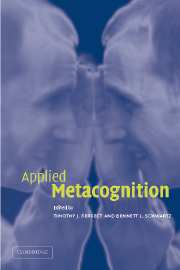Book contents
- Frontmatter
- Contents
- List of contributors
- Preface
- 1 Introduction: toward an applied metacognition
- Part 1 Metacognition in learning and education
- Part 2 Metacognition in everyday memory
- 5 When does eyewitness confidence predict performance?
- 6 Autobiographical memories and beliefs: a preliminary metacognitive model
- 7 Students' experiences of unconscious plagiarism: did I beget or forget?
- Part 3 Metacognition in different populations
- References
7 - Students' experiences of unconscious plagiarism: did I beget or forget?
Published online by Cambridge University Press: 22 September 2009
- Frontmatter
- Contents
- List of contributors
- Preface
- 1 Introduction: toward an applied metacognition
- Part 1 Metacognition in learning and education
- Part 2 Metacognition in everyday memory
- 5 When does eyewitness confidence predict performance?
- 6 Autobiographical memories and beliefs: a preliminary metacognitive model
- 7 Students' experiences of unconscious plagiarism: did I beget or forget?
- Part 3 Metacognition in different populations
- References
Summary
As is often the case with research projects, what sparked our interest in the subject of this chapter – unconscious plagiarism – was a personal experience described to us by colleagues, which appears to be quite common. The experience is this: our colleagues' students believe that their supervisors have stolen their research ideas, while our colleagues believe that the idea was originally theirs, and can provide strong supporting evidence for their beliefs. The prime example we were made aware of involved a postgraduate student who accused his supervisor of having published a paper which appropriated the entire research plan for his Ph.D. The supervisor was justly outraged and amazed at this accusation. She attributed this to unconscious plagiarism of an idea that she first suggested to the student during an initial meeting at which she offered a number of suggestions to assist the student in implementing a research idea. The student was equally convinced that the paradigm he eventually adopted arose from his own intensive reading of the literature and problem-solving skills. The student conceded that at an initial meeting a number of ideas were bandied back and forth; however, he also claimed to remember the process by which he discovered how to apply a particular psychological paradigm to answer a research question in a novel way. This occurred at a date well after the initial discussion with the supervisor, and the novelty of the approach particularly impressed itself on the student's mind.
- Type
- Chapter
- Information
- Applied Metacognition , pp. 146 - 166Publisher: Cambridge University PressPrint publication year: 2002
References
- 1
- Cited by



